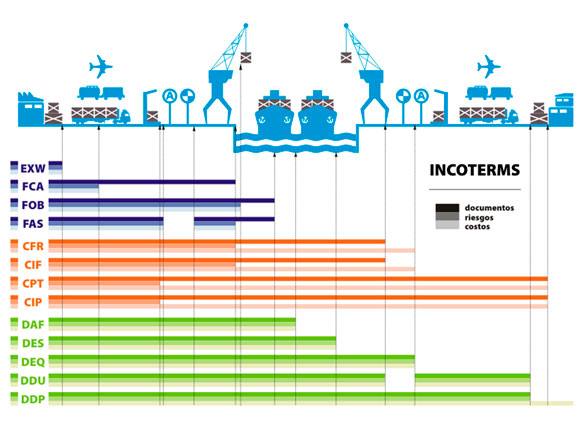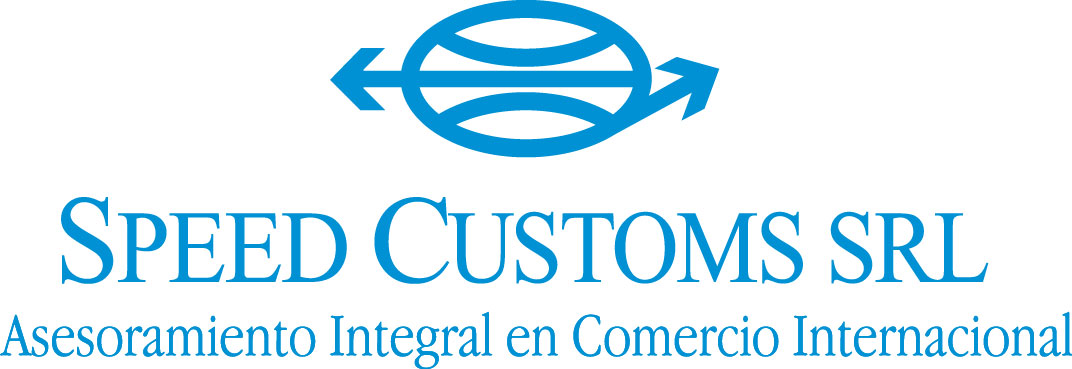The purpose of incoterms
Establish a set of international rules for the interpretation of the terms used in international trade. So as to avoid uncertainties arising from different interpretations of such terms in different countries.
The INCOTERMS and their variety, indicate where it starts and where ends the responsibility of the selling and where begins the responsibility of the purchasing
INCOTERMS determine the point of transfer of the liability of goods in transit.
INCOTERMS do not determine the ownership of a commodity, this point must be contained in any other clause in the contract of sale.
INCOTERMS determine the exact point of transfer of risk and responsibility for the care of the goods between the seller and the buyer.
The Incoterms are grouped in 4 categories:
E: EXW term only by which the seller makes the goods available to the buyer at the seller's premises.
F: FCA, FAS and FOB, the seller is responsible for delivering the goods on a means of transport chosen by the buyer.
C: CFR, CIF, CPT and CIP, the seller contracts for carriage without assuming the risk of loss or damage to the goods or additional costs after the loading and clearance.
D: DAF, DES, DEQ, DDU and DDP, the seller pays all the costs and risks needed to bring the merchandise to the country of destination.
EXW – FACTORY
Ex works" means that the seller delivers the goods to the purchaser when he puts the goods at the buyer's disposal at a designated place (such as a factory or store), and the designated place you can be, or not to, the seller's premises.
For that to happen the delivery, it is not necessary for the seller to load the goods in any collection vehicle, nor is it necessary for the ship for export, where such clearance is applicable.

FCA – FREE CARRIER
this means that the seller delivers the goods to the buyer in one of two ways.
– First, when the designated place are the facilities of the seller. the merchandise is delivered when it is loaded on the means of transport provided by the buyer.
– Second, when the designated place is another, the merchandise is delivered when, having been loaded on the means of transport of the seller, reaches the other designated place and is ready to download from those seller's means of transport and disposal of the carrier or another person nominated by the buyer.
In either of the two options is chosen as the place of delivery, the location identifies where the risk passes to the buyer, and the time from which the costs are for the account of the buyer.
CPT – CARRIAGE PAID TO
this means that the seller delivers the goods, and transmits the risk to the buyer, putting it in the hands of the carrier contracted by the seller or procuring the goods so delivered.
The seller may do so by giving the carrier the physical possession of the goods in the manner and in the place appropriate to the means of transport used.
Once the goods have been delivered to the buyer in this way, the seller does not guarantee that the goods arrive at destination in a good state, in the stipulated amount or even that arrives. This is so because the risk is transferred from the seller to the buyer when the merchandise is delivered to the buyer by placing it in the possession of the carrier; the seller, however, must contract for carriage of the goods from the delivery to the agreed destination. So, for example, the goods shall be put in the possession of a carrier in Vegas (that is not a port) for transport to Southampton (a port) or Winchester (that is not a port). In either case, the delivery transmitting the risk to the buyer happens in Vegas, and the seller shall enter into a contract of transportation to Southampton or to Winchester.
CIP – CARRIAGE AND INSURANCE PAID TO
this means that the seller delivers the goods, and transmits the risk to the buyer.
putting it in to the carrier contracted by the seller or procuring the goods so delivered.
The seller may do so by giving the carrier the physical possession of the goods in the manner and in the place appropriate to the means of transport used.
Once the goods have been delivered to the buyer in this way, the seller does not guarantee that the goods arrive at destination in a good state, in the stipulated amount or even that arrives. This is so because the risk is transferred from the seller to the buyer when the merchandise is delivered to the buyer by placing it in the possession of the carrier; the seller, however, must contract for carriage of the goods from the delivery to the agreed destination. So, for example, the goods shall be put in the possession of a carrier in Vegas (that is not a port) for transport to Southampton (a port) or Winchester (that is not a port). In either case, the delivery transmitting the risk buyer happens in Vegas, and the seller shall enter into a contract of transportation to Southampton or to Winchester.
DAP – DELIVERED AT PLACE
this means that the seller delivers the goods-and transmits the risk - to the buyer when the goods are put at the disposal of the buyer on the means of arrival transport ready for unloading at the named place of destination or at the agreed point within that place, if they agree to such a point.
DPU – DELIVERED AT PLACE UNLOADED
this means that the seller delivers the goods, and transmits the risk to the buyer when the goods, once unloaded from the arriving means of transport on arrival is placed at the disposal of the buyer at a named place of destination or at the agreed point within that place, if they agree to such a point.
The seller bears all risks involved in bringing the goods to the named place of destination, and download it. In this rule Incoterms®, therefore, the delivery and arrival at destination are the same. DPU is the only rule of Incoterms® that requires the seller to unload the goods at the destination. The seller, therefore, you should ensure that you are in a position to organise unloading at the named place. If the intention of the parties was that the seller does not bear the risk and cost of unloading, should be avoided by the rule DUP and use, in contrast, DBH.
DDP – DELIVERED DUTY PAID
this means that the seller delivers the goods to the purchaser when the goods are put at the disposal of the buyer, cleared for import, on the means of arrival transport, ready for unloading, at the named place of destination or
– at the agreed point within that place, if they agree to such a point.
The seller bears all risks involved in bringing the goods to the named place of destination or to the agreed point within that place. In this rule lncoterms®, therefore, the delivery and arrival at destination are the same.
RULES OF THE TRANSPORT MARITIME AND WATERWAYS INTERIOR
FAS – FREE ALONGSIDE SHIP
this means that the seller delivers the goods to the purchaser when the goods are placed alongside the vessel (for example, on the quay or a barge) nominated by the buyer at the named port of shipment when the seller gives the goods already delivered.The risk of loss or damage to the goods passes when the goods are alongside the ship, and the buyer bears all costs from that moment on
FOB – FREE ON BOARD
this means that the seller delivers the goods to the buyer on board the vessel nominated by the buyer at the named port of shipment procures the goods already delivered.The risk of loss or damage to the goods passes when the goods are on board the vessel, and the buyer bears all costs from that moment onwards.
CFR – COST AND FREIGHT
this means that the seller delivers the goods to the buyer on board the vessel or procures the goods already delivered.
The risk of loss or damage to the goods passes when the goods are on board the ship, so that it is considered that the seller has fulfilled his obligation to deliver the goods if this actually reaches its destination, or not, in good condition, in the stipulated amount, or even if it didn't come. In CFR, the seller does not have any obligation to the purchaser to obtain insurance coverage: it is advised to the buyer, therefore, that you get some coverage for himself
CIF – COST, INSURANCE AND FREIGHT
this means that the seller delivers the goods to the buyer on board the ship
procures the goods already delivered.
The risk of loss or damage to the goods passes when the goods are on board the ship, so that it is considered that the seller has fulfilled his obligation to deliver the goods whether you are actually arrives at its destination, or not, in good condition, in the stipulated amount, or even if it didn't come.

